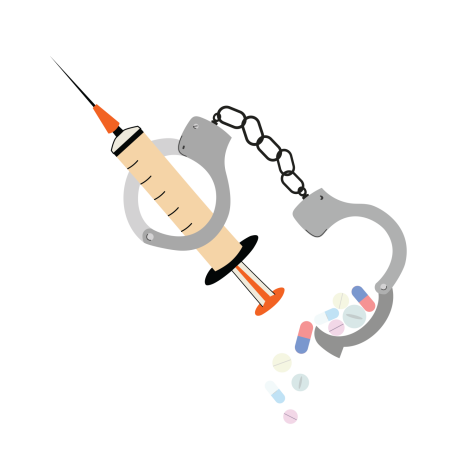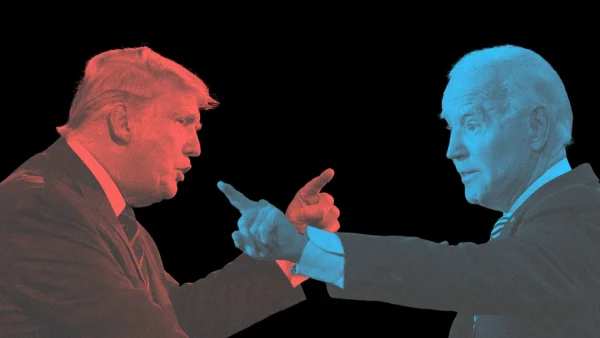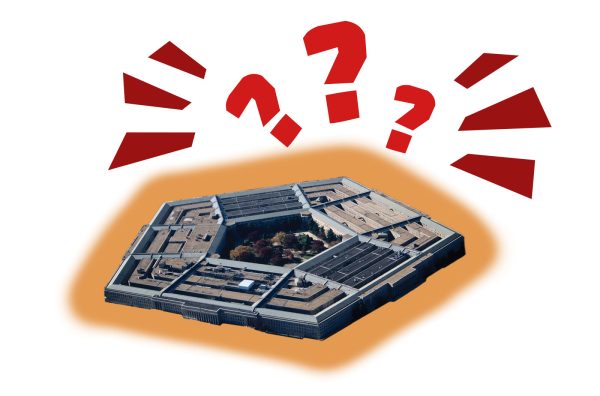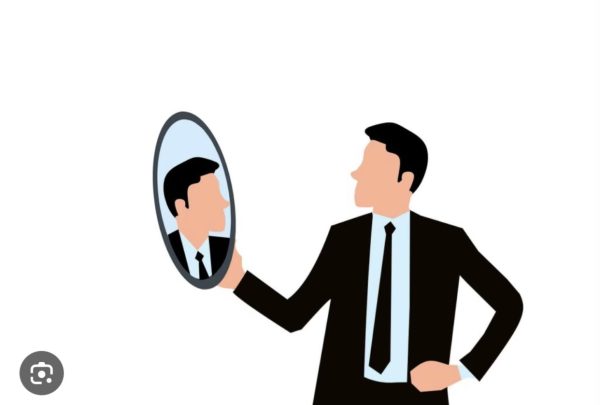D.A.R.E. to Decriminalize Drugs
How decriminalizing drugs would radically transform our society for the better.

Apple pie, baseball and illegally funding fascist paramilitary death squads in Central and South America in an attempt to combat the spread of communism—nothing is more American than these three things. That last one might seem shocking to you, but what if I were to tell you that money not only led to crimes against humanity but also to the funneling of cocaine into the United States and the creation of the “war on drugs.” Thanks to Ronald Reagan and his cronies, America was flooded with drugs and when they were coupled with racist laws, people were forced from their communities for years on end. The only solution to solve this decades-long problem is to decriminalize drugs and end the stigma surrounding their use.
The United States has a combative relationship with drugs. Much of the current stigma surrounding the usage and possession of drugs can be traced back to the Temperance Movement of the 19th century. The belief that drug addicts were somehow both lazy moochers, as well as violent thugs, came to prominence starting in the 1970s under the Nixon administration. The most heinous aspects of the “war on drugs” however were implemented during the Reagan administration. His policies, such as the Comprehensive Crime Control Act, negatively affected marginalized people significantly more than affluent ones by increasing the prison population, tearing apart communities and by establishing the concept of mandatory minimum sentencing in federal law. With these policies, the illegality of drugs has disproportionately affected Black, Indigenous and Latinx communities rather than white ones. The National Institute of Health conducted an investigation that concluded, “Whites and Blacks in our study both reported the same degree of drug sales. Drug sales may be more visible in the inner city, overcrowded Black neighborhoods where they are more likely to take place outdoors.” The solution—decriminalizing drugs. This may seem like an extreme position to hold, but after researching the facts and realizing how pervasive drugs are in our society, it is not feasible to prosecute everyone for possession of drugs. The CDC calls this matter an epidemic, and we should treat it as such.
Drug decriminalization is a mandatory step in achieving justice because its criminalization strips vulnerable communities of members and tears families apart. Decriminalization will help to reform prison policy. The United States has the world’s largest prison population of two million people, which is utilized as a cheap source of labor. The 13th Amendment allows for such activity since the people in prison have been convicted of a crime, but lawmakers and corporations take advantage of this loophole to ensure that small offenses carry years-long sentences. Companies can pay prisoners pennies for their labor and make record profits all the while workers are exploited for trivial reasons. Decriminalizing drugs would severely hamper the prison industrial complex and lead to an end to mass incarceration.
Through abhorrent media coverage, drug use is seen as the moral and internal failure of an individual rather than a symptom of a much greater problem. The health and safety of the individual are of the utmost importance when discussing drug decriminalization. People are going to use drugs regardless of their legality; since they are so pervasive, it only follows that keeping drugs illegal will not work. The United States has outlawed these substances, but not only did that fail, drug usage actually increased. Many find themselves trapped in this cycle of fearing law enforcement so as to not ruin their lives and thus cannot seek treatment. This mentality leads to unnecessary sickness and death that could otherwise be prevented by adequately funded rehabilitation centers. Normalizing drug use would also eliminate the idea that using drugs is some type of moral failure and a reflection on how a person really is. As I mentioned earlier, the United States takes a much more punitive approach to the drug epidemic than other countries. In the 1990s, Portugal was rife with opioids and other narcotics, but once the government took a more compassionate approach, the number of overdoses significantly dropped. In 2001, once this legislation was passed, they saw a significant reduction of overdose related deaths such as the HIV rate being almost halved over fifteen years. Access to rehab is vital in combating addiction rather than sending people to prison because those resources are designed specifically to cure rather than punish.
The cartels which manufacture and distribute drugs would also suffer as a result of decriminalization because they rely on drugs remaining illegal. Without competition, they can charge whatever they want and exploit whoever they want. Decriminalizing drugs would allow for FDA oversight ensuring that there are fewer pollutants and impurities, like lacing additives that cause the most suffering. According to the University of San Diego, when taking a look at the legalization of marijuana, cartels dramatically cut their exports and increased the importation of heroin and methamphetamine. If you follow this trend, decriminalizing “harder” drugs would have much of the same effect because it is incredibly costly to smuggle drugs over the border. Because cartels rely on the competition and illegality of these substances, opening up the market will force them to eventually crumble or conform to regulations.
Some may argue that decriminalizing drugs would not help marginalized people and would instead line the pockets of Big Pharma, as seen with the Purdue Pharma scandal. While it is no secret that pharmaceutical companies make exorbitant profits through the United States’ broken healthcare system, that is no reason to continue fighting a losing battle with the drug addiction epidemic. Dr. Carl Hart, a neuroscientist and psychologist at Columbia University who has devoted his studies to drug reform, notes in an article for Filter magazine, “We need to cut the bullshit and stop pretending drugs inevitably—and only—lead to undesired outcomes.” While abuse of drugs can certainly lead to issues, any activity can be abused to a point where it is self-destructive. Reversing the stigma surrounding drug usage is an important step to bringing about healing for those who have been affected by these policies. The criminalization of drugs has only hurt the communities that the legislation claimed to protect. There must be steps taken to reform these issues so that we can move forward.
The “war on drugs” has had significant impacts on marginalized communities that are still visible today. We see this all the time through people of color being sentenced to more jail time for the same offenses as their white counterparts. Decriminalizing drugs and promoting safe usage will ensure that these communities are not harmed any further and we can work together to help rebuild the damage caused by these predatory policies, institutions and stigmas. The cartels that profit from policies banning drugs will also suffer as a result because they now have greater competition with safer and cheaper alternatives. Overall, decriminalizing drugs will help lead to an end to mass incarceration, ensure people the safety and security to seek treatment and lead to community development that is so desperately needed.
Your donation will support the student journalists of Saint Louis University. Your contribution will help us cover our annual website hosting costs.










